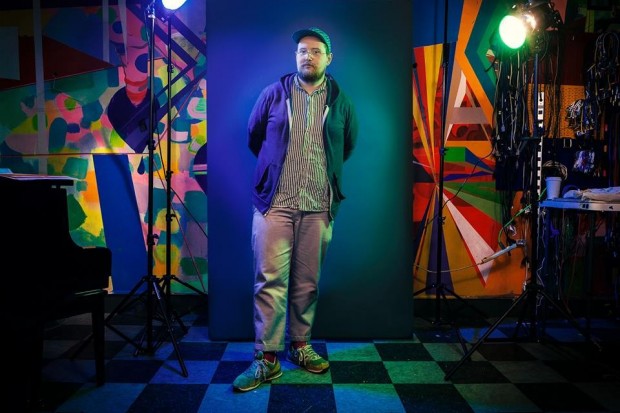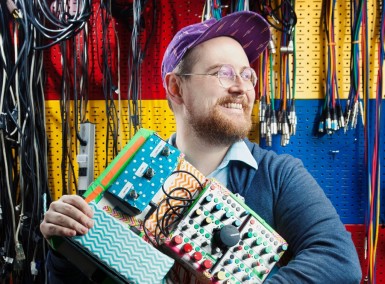2015 is already looking to be a hyped-up whirlwind for Baltimore’s beloved party-starter DAN DEACON. Fresh off the back of an Australian tour he’s about to spend the greater segment of the year journeying across the United States and Europe to celebrate the release of Gliss Riffer, his latest sonic creation. NOTHING BUT HOPE AND PASSION penpalled with DEACON from his current hometown of Baltimore between shows to find out more about the world of this digital enigma.
Hey Dan! Thanks for taking the time to swap a few words with us here at Nothing But Hope and Passion. Where are you as you write this? What are your plans for the rest of the day?
DD: Hi! It’s been rather insane. I’m in my living room. My day is a nightmare; lots of tour planning, packing, jet lag, studio packing (I’m moving studios), house packing (I’m moving out of my room), and rehearsing new songs for tour.
I’ve been lucky enough to catch two of your concerts in the past year; once in Rome, and just recently at MONA FOMA in Tasmania, Australia. What did you think of MOFO, and Tasmania in general? Did you get much time to look around?
DD: MOFO was really great! It was my favourite show of that Australian tour. The venue was amazing and I loved the diversity of the audience. It just felt really great. Tasmania was also really nice. I had been there once before and we hiked around Mount Wellington a bit, which was beautiful. It’s always slightly psychedelic to be in Tasmania, where its so far south but also the coldest. It’s just a trip being from the northern hemisphere where south is so heavily associated with heat. I feel like that shift, being on the opposite side of the earth, forces me to change the way I move through reality, which I find really nice.
How would you describe your current hometown, Baltimore? How did you end up there?
DD: I moved here a little over 10 years ago with a group of friends from college. We all wanted to avoid moving to New York, where many of our other friends moved and seemed to be struggling for money and time. Time was the most valuable thing to me, and still is today. I needed to move somewhere that I could afford to be a musician. Where I could spend the bulk of my time working on my music and my performance. I was completely broke, so I needed somewhere insanely cheap that could also be my studio. Baltimore was the perfect place. it was a right place at the right time moment. I can’t imagine the past 10 years going the way they did had I lived anywhere else.

Photo by Frank Hamilton
Gliss Riffer is like a teenager on a sugar high after sneaking to the lolly store before class; eyes rolling slightly, steeped in colour. Tracks like Sheathed Wings quickly devolve into the rampant, flurrying madness that we’ve come to expect from DAN DEACON‘s short-fuse electronic wizardry. DEACON‘s presence is, as usual, somewhat removed – his voice warped and warbled through the microphone, a far stretch from the involvement of his live performances. This is what makes him so exciting. His music really is a twofold creature between the record and the stage, the latter an exploration and interpretation that tangles itself up in a colourful human psychology of fun and togetherness. To attend a DAN DEACON concert is to immerse yourself in a string of madness and play, human chains folding in and out of venues and clothes being torn off in pursuit of the victorious dance-off title.
The interactive element of your shows is just fantastic, and I’ve seen it work on both a small and large scale now. How did this become such a central part of your live performance? Have you always had an interest in this more theatrical side of music? Do you ever get audiences that don’t participate, despite your best efforts?
DD: I like to think that the audience is the performance. Without an audience there is no show. And the quality of the audience and the quality of what’s happening on stage go hand in hand, in a feedback loop. Over time I started thinking about how performers think of audiences as a group, a singular body, while audience members think of themselves as individuals within a crowd. The theme of individual and collective is something that fascinates me, in a grand systems and society way and in my performance practice. I like creating situations in my shows that steer the audience to start thinking of themselves as the show, with choice, risk, and chance. That shift creates a mental shift from ‘I’ to ‘we’ to ‘they.’ When people chose to participate or chose not to participate, they are making a choice, and I love that.
You come across as quite an outgoing person while you’re performing. Do you think this carries across when you’re not on stage? Would you describe yourself as a ‘people person’?
DD: I think people are cool. I don’t know if I’m a people person, some people drive me insane or make me feel uncomfortable or I just can’t relate to them. like right now I’m on a train and don’t really feel like I’m in my comfort zone but I don’t feel like crawling out of my skin either. I don’t know. I feel comfortable on stage and comfortable around people that don’t seem judgemental or overly cool/self conscious.
How do you think your music morphs between the writing/recording side of things through to its stage rendition? Are they different beasts, do you think?
DD: I think of my performance and studio practices as two separate practices that, at times, intersect. I’m starting to realize that’s insane but its just the way I work and view the processes of each. They certainly inform each other but they are different beasts for sure.
You have a new record that has just been released, titled ‘Gliss Riffer’. How would you describe the album’s conception? Where do you think it sits in comparison with your other pieces?
DD: Like my stage show, I like working in different ways each time I go into the studio. Since 2007’s Ultimate Reality, all of my albums have been C-produced with Chester Gwazda and involved many musicians. America had something like 30 people on it. It was super fun and a great learning experience but I thought it would be fun to go back to basics, and make a record by myself, in my own studio, as my own producer. It’s something I haven’t done in a long time and it was very different since the last time I did it in 2006. I think about sound differently and I myself am a different person, shaped by the experiences of the last 9 years. but without a doubt this record was the most fun album for me to make.
Seeing as the name of our publication is NOTHING BUT HOPE AND PASSION, can you list three things that you hope to bring to fruition before the year is out? They could be large or very tiny things…
DD: I want to be able to actually start meditating, stop eating sugar, and spend several nights under the stars in the desert with friends.
—




